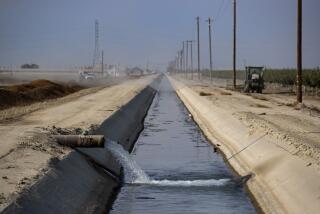U.S. Farm Policy for ‘90s Leaves Wetlands High and Dry : Environment: Other priorities, lack of money keep environmental incentives on the back burner. Push may be on for costly regulations.
- Share via
WASHINGTON — When Congress set farm policy for the first half of the 1990s, it promised to balance the needs of agriculture with concerns about wetlands and water supplies threatened by fertilizers and pesticides.
But when it came time to pay for new environmental initiatives, the money wasn’t there.
Sen. Patrick J. Leahy, chairman of the Senate Agriculture Committee, says he’s frustrated and disappointed at the failure “to keep faith with the commitment of the 1990 farm bill to the environment.”
Leahy, D-Vt., said he and his committee had worked with agricultural interests and environmentalists last year in drafting the five-year bill, but the panel “didn’t make agreements and forge compromises in order to see it all go up in smoke.”
“We can’t talk about a green farm bill when we are unwilling to put our money where our mouths are,” Leahy told the Senate.
Leahy predicts that if Congress refuses to fund incentives for farmers who protect the land and water, environmentalists will insist on less-welcome regulations.
Rep. Glenn English, a Democrat who represents rural western Oklahoma, agrees that Congress was “penny-wise and pound-foolish” with its agricultural appropriations.
English says it’s a matter of paying now for incentives, or paying later to clean up tainted water supplies or for the loss of valuable wetlands, which provide flood control, filter impurities from water sources and are home to numerous endangered species.
“It’s priorities. It’s that simple. We don’t have enough money to go around,” says English, chairman of the House Agriculture subcommittee on conservation, credit and rural development. “And as far as the Appropriations committees are concerned, this was not one of their top priorities.”
Environmentalists say they also are disappointed with the money Congress has set aside for programs on sustainable agriculture and water quality, and with its attempts to gut a plan to preserve wetlands.
“We heard all during the 1990 farm bill debate . . . that agriculture wants to solve its environmental problems primarily with an incentive-type approach, education and technical assistance,” said Ken Cook, vice president for policy at the Center for Resource Economics, an environmental research and publishing organization.
Yet farm groups did not push the appropriations committees to fund the programs, Cook said, and “the shots get called by the signals that they receive from the agriculture community.”
Grace Ellen Rice, a budget specialist with the American Farm Bureau Federation, said the group’s priorities this year were agricultural research and commodity programs, animal and plant health and safety issues, and export enhancements.
“You can only spend your energy and efforts in so many places,” she said. “When was the last time they (environmentalists) worked on some of the production issues we’re interested in?”
More to Read
Get the L.A. Times Politics newsletter
Deeply reported insights into legislation, politics and policy from Sacramento, Washington and beyond. In your inbox twice per week.
You may occasionally receive promotional content from the Los Angeles Times.










